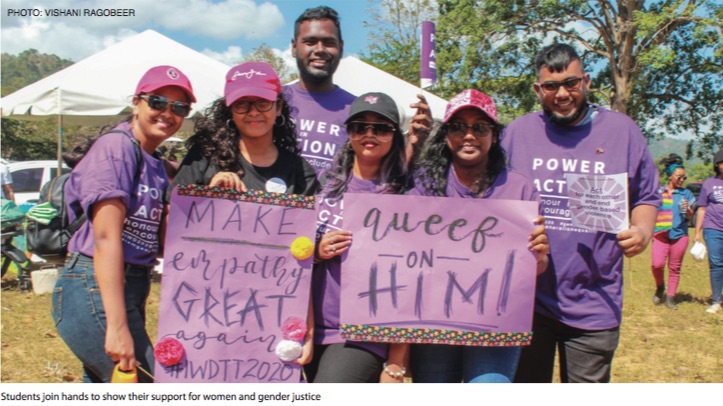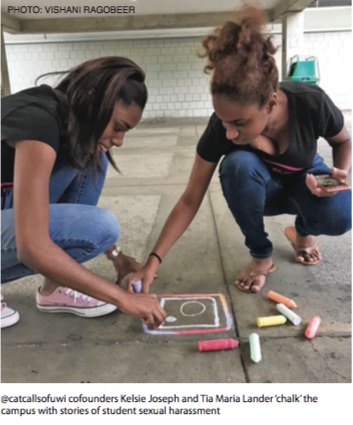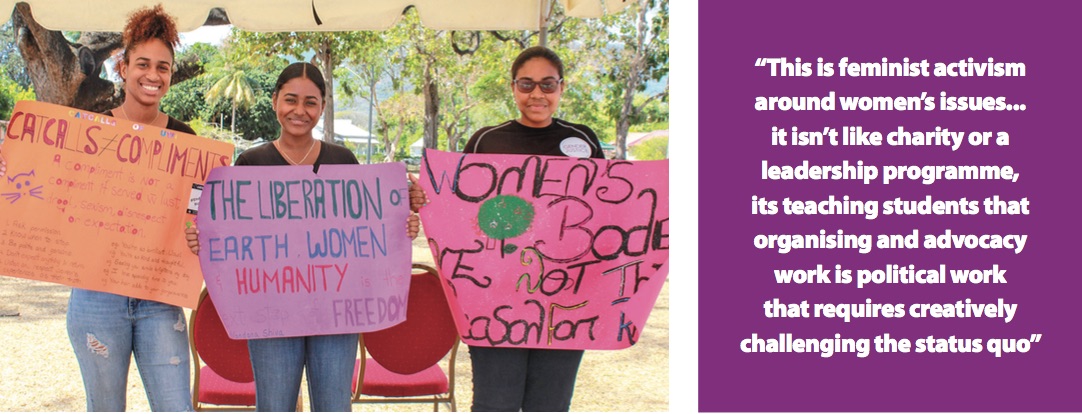IGDS Students Show Up for Gender Justice
Second-year students Kelsie Joseph and Tia Marie Lander of the Institute for Gender and Development Studies (IGDS) decided they had to do something about sexual harassment they saw happening around them.

Kelsie and Tia Marie translated their classroom knowledge into action with the creation of @catcallsofuwi – an Instagram- based cyberfeminist campaign inspired by @catcallsofNYC.
This is also in keeping with The UWI’s core value of Gender Justice, whereby The UWI pledges to actively create and sustain a social, academic, and administrative culture that supports and promotes gender equality and justice within its environments. This policy will require systematic research into its effectiveness with a view to taking appropriate actions of a corrective nature.
Kelsie and Tia Marie may not have known they were enacting The University’s mission when they were moved to translate their classroom knowledge into action with the creation of @catcallsofuwi – an Instagram-based cyberfeminist campaign inspired by @catcallsofNYC.
@catcallsofuwi functions on three principles: to collect empirical evidence that people are harassed on campus in an effort to advocate for better safety and security measures; to redefine the conversation on what harassment is, providing the nexus between harassment and violence; and, to create a safe space for stories to be shared.
If you follow the page on Instagram, you would see the harrowing anonymous recounts of harassment experienced by persons, mostly women, on campus. To a new follower, it is easy to wonder – why are these disturbing posts being made?
“Everybody hopes for a big outcome where everybody probably turns a feminist... [but] it’s the small steps,” Kelsie says. “It’s about opening a pathway for dialogue and conversation, and letting people see that this is not only a problem in society but right here on campus.”
This is the fundamental philosophy that keeps Kelsie and the team going, even on Sundays. They come to The UWI St Augustine Campus to chalk out the messages of sexual harassment and assault in a bid to raise awareness.
Dr Gabrielle Hosein, Head of the IGDS, St Augustine Unit states that, “@catcallsofuwi is almost the pinnacle of the kind of student that can be mentored both out of our formal curriculum and out of our mentorship programme beyond the classroom.”

She explained that IGDS integrates academic learning with a mentorship programme known as IGDS Ignite, a student-led, undergraduate club focused on activism and social justice.
This is merely a component of the wider IGDS mandate to produce graduates who are committed to social justice and the promotion of gender-responsive human relations and development.
In this context, it comes as no surprise that a host of students and staff from the IGDS joined a coalition of organisations to honour International Women’s Day (March 8) at the Annual Women’s Rights Rally & March at the Queen’s Park Savannah.
On that sunny Saturday afternoon, persons marched around the Savannah to exemplify this year’s theme: “Power in Action”. They came equipped with their placards in hand and energies focused on publicly demanding an end to the myriad of injustices meted out to women.
Whether it was highlighting the societal ills of domestic violence, discriminatory workplace practices or sexual harassment, the message was clear: these injustices need to end and they need to end now.
Added to that, the stakeholders working in the different spheres of women’s rights converged on the savannah grass to showcase their work and find more ways to collaborate across sectors.
This event was microcosmic of the kind of values that the IGDS hopes to instil in each student.
“This is feminist activism around women’s issues...it isn’t like charity or a leadership programme; its teaching students that organising and advocacy work is political work that requires creatively challenging the status quo,” Dr Hosein affirmed.

Movements like this and @catcallsofuwi are just a few examples of proactive approaches needed to effect relevant positive change for the conventionally uncomfortable topic of sexual harassment. The result is ultimately the creation of safe spaces for young people to take an active leadership role.
While the students of IGDS represent a cadre of young leaders being equipped to effect positive social change, there remains a lack of critical thinking skills about social justice and gender across the student population. The IGDS Head believes that is simply because they are not exposed to gender analysis in a significant way.
“If students were more systematically exposed to a gender analysis beyond the IGDS, then it would help to build a generational movement in which these issues have greater buy- in and a greater number of people understand the importance of the work.”
And the important work continues on the ground, in digital spaces and everywhere where students refuse to remain silent on issues of gender justice.